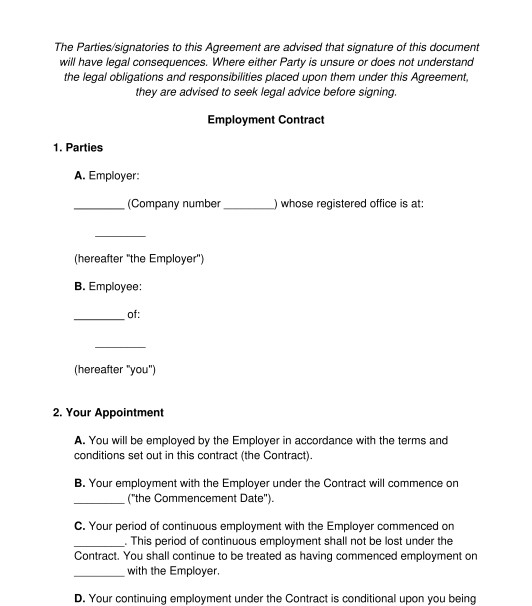 06/11/2025
06/11/2025

Answer a few questions and your document is created automatically.

Your document is ready! You will receive it in Word and PDF formats. You will be able to modify it.




Rating: 4.6 - 59 votes
Fill out the templateAn employment contract is an agreement between an employer and an employee that sets out the terms and conditions upon which the employee shall be hired by the employer.
There are two types of employment contracts: indefinite employment contracts and fixed term employment contracts.
The main difference between a service contract and employment contract is the element of control. Under an employment contract, the employer has more control over the employees and the employees do not have autonomy over how they carry out their assigned tasks contained in the contract. As a consequence of this control, the employee receives regular wages and benefits along with the employer covering other overhead costs (e.g. subscriptions, sick pay, holiday pay, office supplies etc). The employee's salary is also subject to PAYE (Pay As You Earn) tax which will be deducted from the employee's gross salary.
Under a service contract, the service provider has more control and autonomy over how they carry out their assigned tasks and contracted work. They also bear full responsibility for tax payments and other overhead costs (e.g. subscriptions, sick pay, office supplies etc).
No, it is not mandatory to have a formal written employment contract. The contract of employment can be oral/verbal or implied through the conduct of the parties. However, it is recommended to have a written employment contract that clearly explains the terms and conditions of employment.
It is worth noting that even where there is a written employment contract, it may be overruled by conduct of the parties in certain circumstances. As such, it is important to ensure that the employment relationship follows the written contract where there is one.
An employment contract should contain:
It is not allowed to have an exclusivity clause in an employment contract that prohibits the employee from getting additional employment elsewhere.
It is not allowed to have a clause in the employment contract that requires the employee to commit an illegal act.
It is not allowed to have a clause that discriminates against an employee based on age, gender, disability, race, sexual orientation, religion or belief.
It is not allowed to have a restrictive clause that is not "reasonable". Restrictive clauses include non-compete clauses, non-solicitation clauses, non-disclosure clauses etc. To be legally enforceable, the clause must be for a reasonable time and/or only affect a reasonable geographical location.
The parties to an employment contract are the employer and the employee. The employer will usually be a business that can be a sole trader, a general partnership, or a corporate entity (i.e. a company or a limited liability partnership).
The employee will be a natural person who has to be at least 16 years old to carry on full-time employment. Full-time employment means working for a maximum of 40 hours per week. From 18 years of age, the employee will be subject to adult employment rules.
An employment contract can be for an indefinite period of time, in which case it can be terminated by notice of either party, or a fixed contract that is for a defined time after which it will either come to an end or be extended for a set period of time or convert to and indefinite term.
The employer should give the prepared document to the employee, who will sign and then return to the employer. Both parties should sign two copies of the employment contract and return one to the other party. Where the employer is a corporate entity, it should be signed by an authorised person within the employer's organisation (e.g. HR Director, Managing Director, Designated Member in an LLP).
No, it is not necessary to have witnesses for an employment contract. The contract will be properly executed once it has been signed by both the employer and the employee.
Key legal provisions include:
In addition, employers should be aware of the ACAS guidelines and procedures.
You fill out a form. The document is created before your eyes as you respond to the questions.
At the end, you receive it in Word and PDF formats. You can modify it and reuse it.
Guides to help you
Employment Contract - Sample, template - Word & PDF
Country: United Kingdom